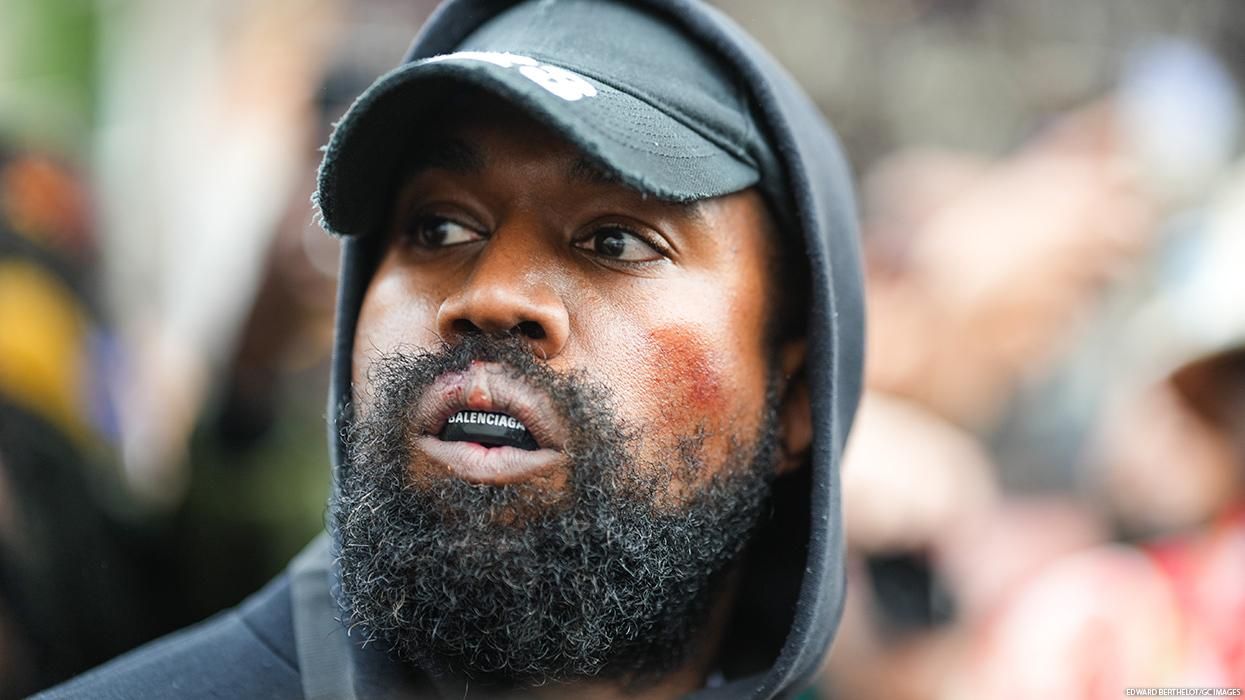When's the last time you heard someone blame "the elite"?
When talking politics, many are quick to point fingers at this seemingly faceless group. In progressive circles, "the elite" represent an upper class defined by their accumulated wealth and control of resources — capitalists like Jeff Bezos or Elon Musk, whose riches could singularly end world hunger or environmental crises were they willing to part with them.
In other circles, "the elite" can represent something much more sinister. While there's no denying that affluent individuals have unfair advantages in society, conservatives often generalize "affluent" with just one demographic — the Jewish community.
One such conservative is musician Ye, formerly known as Kanye West, who's recently made headlines for a myriad of activities, including wearing a "white lives matter" shirt at Paris fashion week, and a two-part interview with Fox News' Tucker Carlson, where he touted his anti-abortion stance and support for former president Donald Trump's MAGA movement.
This weekend, Ye was officially restricted from Instagram and Twitter following direct threats against the Jewish community.
"I'm a bit sleepy tonight but when I wake up I'm going death con 3 On JEWISH PEOPLE," Ye wrote in a since-deleted Tweet. "The funny thing is I actually can't be Anti Semitic because black people are actually Jew also You guys have toyed with me and tried to black ball anyone whoever opposes your agenda."
"Death con" is a misspelled reference to the military term "defcon," which evaluates supposed national threats on a scale from five to one. Ye's tweet suggests that the rapper was expecting threats from Jewish people, or that he would inflict violence on them himself.
Leaked text messages between Ye and fellow musician P. Diddy, also known as Puff Daddy, revealed more anti-Semitic sentiment on Ye's part. When Diddy disagreed with Ye's wearing of the infamous "white lives matter" shirt, which directly promoted the racist hate-group, Ye accused Diddy of being controlled by said "elites" —Jewish individuals.
"Ima use you as an example to show the Jewish people that told you to call me that no one can threaten or influence me," Ye sent.
Ye's increasingly reactionary behavior has been alarmingly to many, but what does it mean now that he's attacking the Jewish community? The history of anti-Semitism is a long and complicated one, but the rapper's recent invoking of insidious stereotypes is deeper than one may think.
The idea that Jewish people are good with money is among the oldest stereotypes, stemming from the medieval Christian ideology that usury (charging interest) constituted a sin. As they were already confined to ghettos, prohibited from buying land, or barred from trade/artisan guilds, many Jewish people entered the field of finance.
Historian Howard Sachar estimated that, as of the 18th century, “perhaps as many as three-fourths of the Jews in Central and Western Europe were limited to the precarious occupations of retail peddling, hawking, and ‘street banking,’ that is, moneylending.”
Among conspiracy theorists, this historical trend has been interpreted as the Jewish community shadily manipulating world finances, just as Ye falsely believes Diddy was manipulated. But there's a much more insidious belief that Ye has promoted with his comments.
Reactionaries accuse Jewish people of puppeteering world affairs for the sake of an ancient anti-Semitic canard — the fallacy of blood libel. Dating as far back as first century BCE, though most prevalent during the middle ages, the blood libel myth falsely accuses Jewish people of murdering Christian boys for the sake of religious rituals. Though unequivocally debunked, the delusion has driven the persecution of Jews from medieval Europe into the modern age. This, alongside other misbeliefs, led to the deaths of six million Jews during the Holocaust.
The most pressing contemporary example of this accusation comes from rising internet conspiracy group, QAnon. The Anti-Defamation League describes the movement as "a sprawling conspiracy theory that alleges (among other things) that Hollywood and the upper echelons of the Democratic Party are controlled by a cabal of Satanic pedophiles."
A popular belief among those who ascribe to QAnon is that, after molesting their victims, members of this cabal kill and eat the children to extract a life-extending chemical called adrenochrome. Nearly identical to the myth of blood libel, QAnon's beliefs blame one group for their conspiracies — the "elite."
Referencing the "elite" has become synonymous to an anti-Semitic dogwhistle. Is everyone who criticizes an undefined ruling class engaging in anti-Semitism? Not necessarily. It depends on the context of their comments, and the information presented alongside them.
In the case of Ye, his finger-pointing at Jewish people isn't just anti-Semitic — it's actively promoting and spreading the beliefs of QAnon. By extension, Ye is directly supporting Nazi and neo-Nazi ideologies.
While the ADL also suggests that QAnon will likely fade into obscurity as time goes on, Ye is a massive public figure whose rhetoric is capable of spreading to impressionable listeners for years to come. Twitter and Instagram have already suspended the rapper from their platforms, but it remains unclear how long this hiatus will last. Adidas is also reconsidering it's partnership with Ye following the "white lives matter" debacle, yet nothing official has been announced.
Temporary fixes are never enough to stop the spread of insidious misinformation. Media must stop giving uncritical attention and credence to Ye's beliefs. To truly curtail his harmful comments, companies must take a stand against anti-Semitism and fully deplatform Kanye West.
- 97-year-old Former Nazi Secretary Sentenced for More Than 10,000 Murders - Advocate Channel ›
- Man Arrested for Vandalizing Menorah With a Nazi Symbol - Advocate Channel ›
- Julia Fox Doesn't Think Kanye West Knows Her Full Name - Advocate Channel ›
- United Arab Emirates Becomes First Arab Nation to Teach About the Holocaust - Advocate Channel ›
- What Does It Mean to Be Jewish in the US? | AdvocateChannel.com ›
- How Billionaires Ruined Burning Man ›


















































